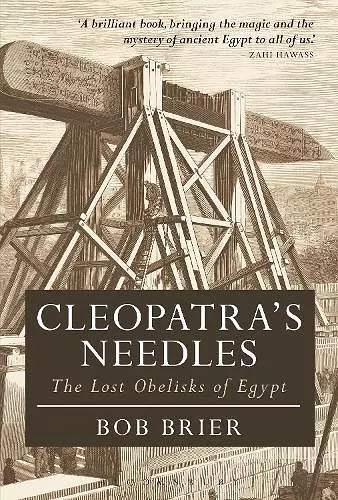Cleopatra's Needles
The Lost Obelisks of Egypt
Format:Paperback
Publisher:Bloomsbury Publishing PLC
Published:11th Feb '21
Currently unavailable, our supplier has not provided us a restock date

Fascinating account of an iconic Egyptian monument, the obelisk, and how its most famous examples have come to reside in three of the world's capitals.
In the half-century between 1831 and 1881 three massive obelisks left Egypt for new lands. Prior to these journeys, the last large obelisk moved was the Vatican obelisk in 1586 – one of the great engineering achievements of the Renaissance. Roman emperors moved more than a dozen, but left no records of how they did it. The nineteenth-century engineers entrusted with transporting the obelisks across oceans had to invent new methods, and they were far from certain that they would work. As the three obelisks, bound for Paris, London and New York, sailed towards their new homes, the world held its breath. Newspapers reported the obelisks’ daily progress, complete with dramatic illustrations of the heroic deeds of the engineers and crews struggling under nearly impossible conditions. When the obelisks finally arrived safely in their new homes, bands played Cleopatra’s Needle Waltz and silver obelisk pencils dangled from fashionable ladies’ necks.
This turbulent era, caught up in obelisk mania, is recreated by Bob Brier in all its glory. Amid astounding tales of engineering dexterity and naval endurance, the individuals involved in transporting the obelisks and receiving them in their future homes are brought to life through their letters and diaries, newspaper articles and illustrations. Written by a renowned Egyptologist and author, this compelling book will fascinate all those interested in Egypt, its iconic monuments and the history of great endeavour.
[A] well-researched and amiable account ... If you want to know how to quarry, carve and erect a huge block of granite, then Brier is your man. He meticulously reconstructs the steps taken by the Egyptian stonemasons ... turning then to document the later transportation of obelisks to foreign places. * The Spectator *
Obelisks were one of the greatest technical achievements of Ancient Egypt, but they are also a tribute to the skills of the Romans, the Renaissance, and the modern world. Here is a readable and urbane account of both these works of art. * Times Literary Supplement *
Mr. Brier tells these stories with panache and with authority. His cast of characters-pharaohs, emperors, popes, engineers, Egyptologists and millionaires-can hardly be beat. And he restores wonder to these enigmatic objects created so long ago. * Wall Street Journal *
Brier brings an Egyptologist’s perspective, a fascination with engineering, considerable storytelling skills, and a conversational tone honed by professional broadcasting. Together, this makes for a generally enjoyable read. -- Andrew Robinson * Science *
Recaptures obelisk mania anew ... [It is] the unexpected illustrations that ultimately provide this book's captivating originality. * History Today *
This work contains much fascinating and obscure detail that makes for an entertaining and informative read. * Ancient Egypt *
Deftly navigating a wide range of primary sources, Bob Brier illuminates the terrors and triumphs of everyone involved throughout the history of the ‘obelisks in exile’, allowing a new appreciation of ancient and historical technological hurdles, imperial ambition, and cultural appropriation. * Current World Archaeology *
A generous account. * The Literary Review *
Cleopatra's Needles is written in Brier's informal, easy-to-read style and will certainly be a welcomed addition to any Egyptophile's library. * KMT Magazine *
The book is impressive in its range ... the style is informal and very readable ... this is a fascinating and very informative piece of work. * Classics for All *
Bob Brier brilliantly draws the reader’s attention to the adventurous stories of these obelisks in times when the Western World was caught up in obelisk mania. For readers interested in the history of science, this book will be highly welcome. -- Carola Vogel * Bryn Mawr Classical Review *
This book goes some way towards reigniting the original enthusiasm and appreciation felt for these rare and unique monuments. Accompanied by numerous illustrations throughout, this book is a pleasure to read ... Brier’s account of the needles is well informed and is a successful general interest work on a fascinating subject, providing perhaps for the first time a well-written and approachable introduction to the world of the obelisk. * ASTENE Bulletin *
Pointing to the heavens, ancient obelisks proudly display their Egyptian origins to the world. Often embellished with informative royal hieroglyphic inscriptions, many obelisks have now gained an additional historical layer—the fascinating and sometimes controversial narrative of their travels from Egypt to faraway lands. Bob Brier captures these stories with his thorough research and unique storytelling skills. * Peter Der Manuelian, Philip J. King Professor of Egyptology, Harvard University, USA, and Director, Harvard Semitic Museum, USA *
A book full of fascinating and obscure details about Egyptian obelisks, this volume by Bob Brier is written in his usual chatty manner. Meticulously researched, it offers an entertaining and informative read for both scholars and the general public. * Rita E. Freed, John F. Cogan Jr. and Mary L. Cornille Chair, Art of the Ancient World, Museum of Fine Arts Boston, USA *
Cleopatra’s Needles is a brilliant book, bringing the magic and the mystery of ancient Egypt to all of us. * Zahi Hawass, Egyptologist, Egypt *
Brier’s narrative is compelling and at times thrilling. His descriptions of the men and the challenges they overcame to move these beautiful monoliths during the nineteenth century make the technical skills and the artistic genius of their ancient Egyptian creators all the more remarkable. * Classical Journal *
ISBN: 9781350198722
Dimensions: 232mm x 156mm x 14mm
Weight: 380g
248 pages